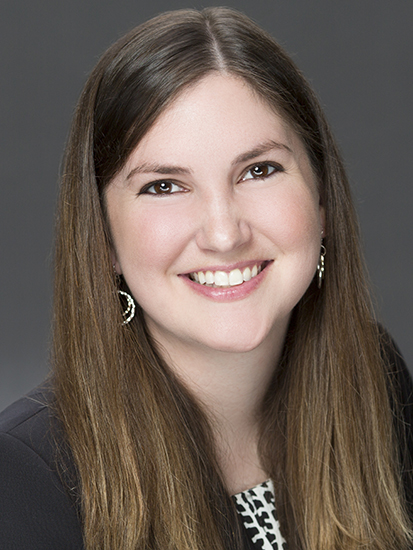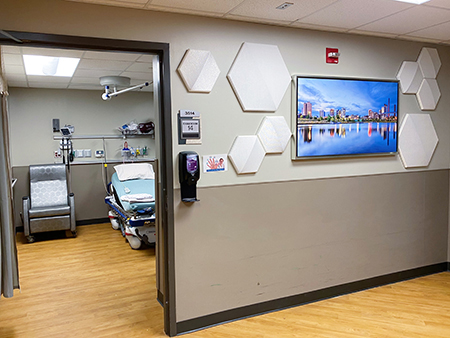 A grant from UAB’s Health Services Foundation General Endowment Fund will support a project testing an AI tool to improve patient care and safety for older adults in UAB’s Geriatric Emergency Department at UAB Hospital-Highlands.People living with dementia are more likely to visit the emergency department than are people who do not have dementia, with the main causes being falls and other accidents, as well as mood fluctuations, day-night reversal and other behavioral disturbances. These patients are also more likely to experience adverse patient safety events when they are at the hospital, contributing to poor outcomes for the patients themselves and endangering provider and patient safety.
A grant from UAB’s Health Services Foundation General Endowment Fund will support a project testing an AI tool to improve patient care and safety for older adults in UAB’s Geriatric Emergency Department at UAB Hospital-Highlands.People living with dementia are more likely to visit the emergency department than are people who do not have dementia, with the main causes being falls and other accidents, as well as mood fluctuations, day-night reversal and other behavioral disturbances. These patients are also more likely to experience adverse patient safety events when they are at the hospital, contributing to poor outcomes for the patients themselves and endangering provider and patient safety.
This is why many acute care hospitals use patient sitters, who provide one-on-one care for agitated and disoriented patients. In September 2022, UAB Medicine began a Virtual Sitter Program to provide an additional layer of safety for patients in some areas of the hospital.
“The use of remote visual monitoring technology as a ‘telesitter’ in hospitals has been shown to reduce falls and increase the efficiency of patient observation,” said Rachel Skains, M.D., MSPH, an assistant professor in the Department of Emergency Medicine.
With a new grant from UAB’s Health Services Foundation General Endowment Fund, or HSF-GEF, Skains and other UAB clinicians are expanding this telesitter service to patients in the Level 1-accredited Geriatric Emergency Department at UAB Hospital-Highlands.
 Rachel Skains, M.D., in principal investigator for the project.In a first at UAB, moreover, they are piloting an artificial intelligence tool along with the telesitter program; the AI is trained to predict fall risk and identify signs of delirium in video images and immediately alert staff for intervention.
Rachel Skains, M.D., in principal investigator for the project.In a first at UAB, moreover, they are piloting an artificial intelligence tool along with the telesitter program; the AI is trained to predict fall risk and identify signs of delirium in video images and immediately alert staff for intervention.
“Over the last few years, AI has been applied to patient monitoring technology to provide accurate and reliable fall and delirium prevention,” said Skains, who is principal investigator for the project. “If this project is successful, AI can be integrated into a university-wide telesitter program, which will improve workflow to reduce the need for specially trained virtual sitters. This will ultimately improve telesitter efficiency and reduce health care costs.”
Skains is an early-stage clinician-investigator focused on improving the care of older adults in the ED, particularly cognitive impairment. Other members of the team are Eric Wallace, M.D., medical director of UAB Telehealth/eMedicine, and Marie-Carmelle Elie, M.D., chair of the Department of Emergency Medicine.
UAB’s Geriatric Emergency Department is the first and only facility in Alabama and the first in the Southeast to receive Level 1 (Gold) accreditation from the American College of Emergency Physicians.
The care processes and the facilities in the Geriatric ED are tailored specifically for older adults, including the use of separate enclosed rooms; sound-absorbing materials and other accommodations to reduce noise; non-slip flooring; and color-contrasting walls, floors and doors.
 The geriatric ED at UAB Hospital-Highlands is equipped with LED lighting with bi-level dimming, non-slip flooring and color-contrasting walls, floors and doors.All older adults who arrive at the ED receive an Identification of Seniors at Risk assessment and, when warranted, additional screenings and resources from a geriatric emergency nursing intervention expert, or GENIE nurse, who also stays in touch with the patient and caregivers after discharge.
The geriatric ED at UAB Hospital-Highlands is equipped with LED lighting with bi-level dimming, non-slip flooring and color-contrasting walls, floors and doors.All older adults who arrive at the ED receive an Identification of Seniors at Risk assessment and, when warranted, additional screenings and resources from a geriatric emergency nursing intervention expert, or GENIE nurse, who also stays in touch with the patient and caregivers after discharge.
“If we successfully pilot expanding the AI telesitter program in the UAB-Highlands Geriatric ED with our HSF-GEF project, we will consider applying to other funding sources,” Skains said, including the pilot award programs from the National Institute on Aging and NIDUS, the Network for Investigation of Delirium: Unifying Scientists, a collaborative research network funded by the National Institutes of Health.
“Our objective is to improve patient care and safety for older adults in the emergency department,” Skains said. “That is the primary goal driving this project.”
Related:
Health Services Foundation awards $1.5 million in General Endowment Fund grants for 2024 - see a complete list of projects that received funding in the latest round of HSF-GEF awards.